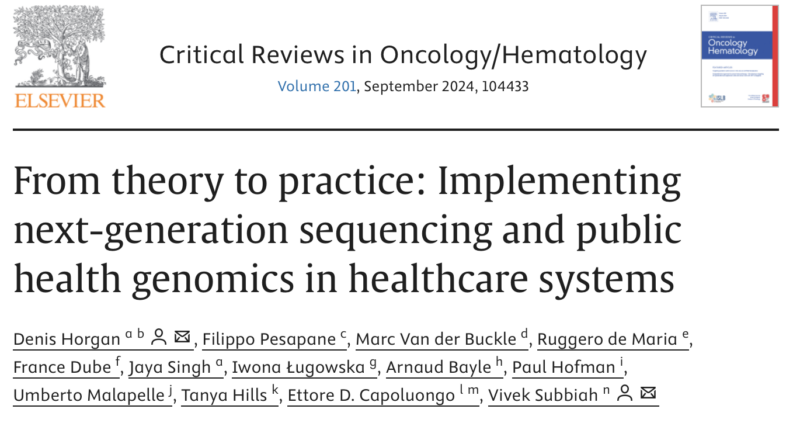
Denis Horgan: Implementing NGS and PHG in healthcare systems
Denis Horgan, Executive Director from the European Alliance of Personalised Medicine (EAPM), shared a post on LinkedIn:
Authors: Denis Horgan, Filippo Pesapane, Marc Van der Buckle, Ruggero de Maria, France Dube, Jaya Singh, Iwona Lugowska, Arnaud Bayle, Paul Hofman, Umberto Malapelle, Tanya Hills, Ettore D. Capoluongo, Vivek Subbiah.
Brussels, July 17th, 2024: The integration of Next-Generation Sequencing (NGS) and Public Health Genomics (PHG) hinges upon various factors such as the presence of molecular tumor boards, reimbursement policies, healthcare workforce capabilities, and the authorization and practice of data sharing and linking.
In our recent paper, we explored the integration of NGS and PHG by examining the provision of essential components at the national level. By delineating developmental stages, as undertaken here, it becomes feasible to monitor advancements and potentialities from the initial introduction of innovation to the complete optimization of NGS, and to outline the pathway toward the effective implementation of PHG. In both investigations, the journey encompasses five stages, spanning from a stage of ’no development’, characterized by a lack of acknowledgment or utilization, to the stage of full establishment, optimization, and ongoing enhancement aimed at achieving maximum efficiency and effectiveness.
And because the effective deployment of better diagnosis and therapy is not a one-way street, but depends heavily also on engagement of patients and of an informed general public, a parallel patient survey on cancer tracks awareness – of prevention, and of the understanding of heredity, epigenetics, and early cancer development and mechanisms, as well as blood tests for early detection, technologies for early diagnosis, personalized prevention, and early screening.
Overall, the findings in this paper highlight disparity in NGS integration among the countries studied, with some countries benefiting from the advances they have made in meeting preconditions and offering a high level of integration, while others, much lower down the fulfilment scale, offer their patients less integrated services.
The examination of PHG indicates a notable performance by the Nordic nations, contrasted with varied performance levels across other regions. This analysis suggests that many patients in these areas exhibit a thorough grasp of the factors contributing to cancer development and the significance of early detection.
Ultimately, the future trajectory largely rests on the attitudes of policymakers who hold sway over legislative decisions, resource allocation, and the strategic trajectory of healthcare. European-level decisions regarding health priorities, both immediate and long-term, are influenced by a myriad of factors but remain open to well-founded arguments supported by evidence.”

Source: Denis Horgan/LinkedIn
-
Challenging the Status Quo in Colorectal Cancer 2024
December 6-8, 2024
-
ESMO 2024 Congress
September 13-17, 2024
-
ASCO Annual Meeting
May 30 - June 4, 2024
-
Yvonne Award 2024
May 31, 2024
-
OncoThon 2024, Online
Feb. 15, 2024
-
Global Summit on War & Cancer 2023, Online
Dec. 14-16, 2023
